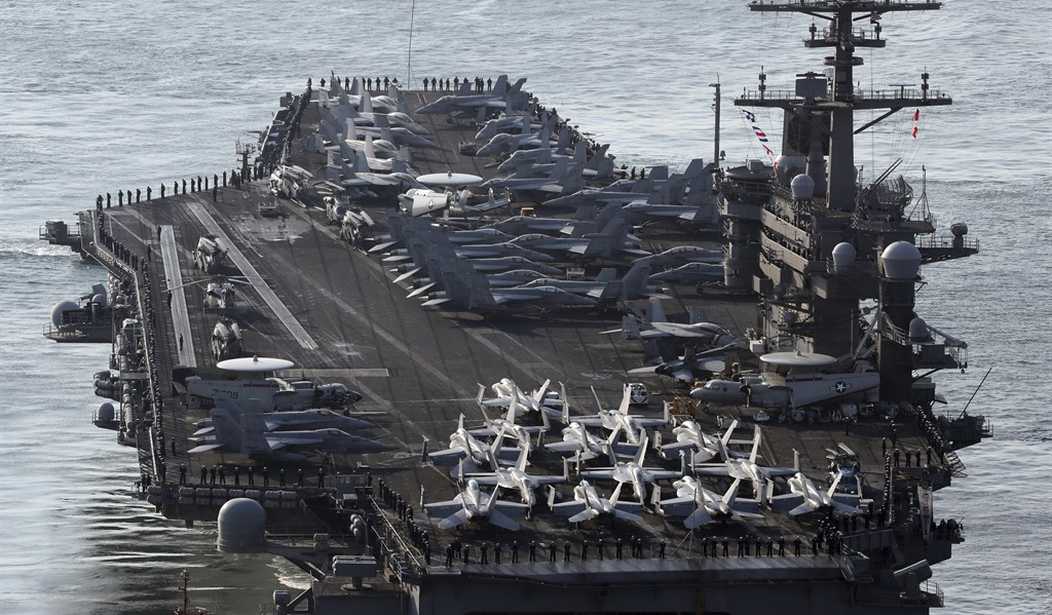The Trump Administration may be looking to flex its military might a bit by sending an aircraft carrier group to the Korean Peninsula. The Guardian reports the move appears to be a way for the U.S. to say it isn’t happy with North Korea’s missile test from earlier this month.
“US Pacific Command ordered the Carl Vinson strike group north as a prudent measure to maintain readiness and presence in the western Pacific,” said Commander Dave Benham, spokesman at US Pacific Command.
“The No 1 threat in the region continues to be North Korea, due to its reckless, irresponsible and destabilising programme of missile tests and pursuit of a nuclear weapons capability,” he said, in an unusually forceful statement.
The move is a day or so after the leak to NBC News on some of the options being considered regarding North Korea and Secretary of State Rex Tillerson’s comments that China would be more involved in dealing with Kim Jong-un. Jazz wrote yesterday the leak shouldn’t have happened, but it’s possible it was done to say to someone (China?) that the U.S. is serious about smacking down North Korea, in one shape or form.
Tillerson may have given more credence to this theory in comments he made to CBS’ Face the Nation on China/North Korea (emphasis mine):
“I think it was a very useful and productive exchange. President Xi clearly understands, and — and I think agrees, that the situation has intensified and has reached a certain level of threat that action has to be taken.”
“And, indeed, the Chinese, even themselves, have said that they do not believe the conditions are right today to engage in discussions with the government in Pyongyang. And so what I think we’re hopeful is that we can work together with the Chinese to change the conditions in the minds of—of the DPRK leadership. And then, at that point, perhaps discussions may be useful. But I think there’s a shared view and no disagreement as to how dangerous the situation has become. And I think even China is beginning to recognize that this presents a threat to even — to— to China’s interests as well.”
I’m of two minds on this. It’s a good idea to engage in diplomacy with China on North Korea, as long as the North Koreans are involved in it. If the U.S. and China are going to gang up on Kim Jong-un and try to dictate what North Korea does and doesn’t do, then it’s an issue. I do not believe it is in the country’s best interest, or constitutional, to try to force other countries to bend to our will. Nor do I believe it’s constitutional to hand out money to various different countries in the form of “foreign aid.”
The best solution to the North Korea problem is two-fold: you let China engage with North Korea (since they are its primary economic backer) and you engage North Korea by letting various different companies go into the country to trade with its citizens. This promotes freedom and liberty by introducing free markets into North Korea, something they don’t have right now. It’s a tough pill to swallow for the interventionists, who want the U.S. to be “Team America: World Police,” but something which does work, whether they want to admit it or not. It just takes time.
There is an interesting theory as to why China doesn’t really appear interested in controlling North Korea. The Economist suggests China is more interested in the status quo to protect its own interests, especially if North Korea’s missiles are actually a threat.
Yet even though China fears unilateral American action, it seems unlikely to make radical policy changes to forestall it. Two old reasons for backing the regime in the North have as much force as ever: China does not want the reunification of the Korean peninsula if it creates a single, larger American ally on its border. And millions of North Koreans might flee from the collapse of their country into China, exporting instability into China’s three north-eastern provinces, which are among the most economically depressed in the country. There are also three newer reasons. First, the North’s missiles are not, for the moment, pointed at China. But they could be if China turns on its protégé. Second, China does not perceive a North Korean ICBM as a profound threat in the way that the Americans do. Lastly, China is worried about South Korea’s plans to deploy an American anti-missile system, called Terminal High-Altitude Area Defence, or THAAD, which it claims is really aimed at its own missiles. So it continues to align itself with the North against the South. China, it seems, cares more about other countries’ reaction to North Korea’s belligerence than the belligerence itself.
The Trump Administration’s policy, right now, appears to be, “speak softly and carry a big stick,” because you haven’t seen the president go off on a North Korea Twitter rant (not yet anyway). I’m just not sure it’s wise to move the carrier group into the Korean Peninsula. The U.S. hasn’t been attacked, and an attack doesn’t seem likely. It’s probably best to try other alternatives before deciding to do saber rattling.








Join the conversation as a VIP Member